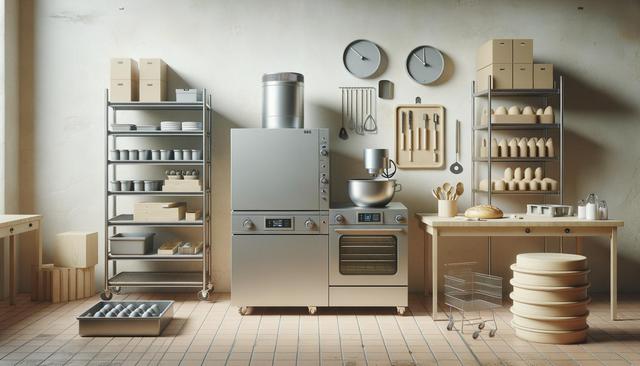Commercial Mixers: The Backbone of Dough Preparation
Commercial mixers are indispensable in any bakery setting. Whether you’re preparing bread dough, cake batter, or cookie dough, a reliable commercial mixer significantly reduces manual labor and helps maintain consistency across batches. There are different types of mixers suited for specific tasks, including planetary mixers, spiral mixers, and vertical cutter mixers. Choosing the right type depends on your bakery’s production volume and the variety of products you offer. For example, spiral mixers are particularly effective for heavy doughs like those used in artisan breads, while planetary mixers offer versatility for cakes and light batters.
Features to consider when selecting a commercial mixer include:
- Bowl capacity
- Speed settings and controls
- Durability of the motor
- Ease of cleaning and maintenance
Investing in a high-quality mixer ensures smoother operations and reduces the likelihood of downtime caused by equipment failure. It’s a critical step in scaling up and meeting customer demand efficiently.
Ovens: Consistency in Baking Performance
Ovens are the heart of any bakery, and selecting the right type can make all the difference in product quality and operational flow. There are several types of commercial ovens including convection ovens, deck ovens, and rack ovens. Each serves a different purpose: convection ovens are ideal for even baking of pastries and cookies, while deck ovens are often used for artisan bread due to their capability to retain high temperatures and distribute heat evenly.
Key considerations when purchasing a commercial oven include:
- Temperature range and control
- Capacity and size relative to your kitchen space
- Energy efficiency
- Ease of use and programmable settings
Streamlining operations with the right oven not only boosts productivity but also helps maintain consistent quality across products. An energy-efficient oven can also cut costs in the long run, making it a smart investment for growing bakeries.
Proofing Cabinets: Optimizing Dough Rising
Proofing cabinets, also known as proofers, are essential for controlling the fermentation process of yeast-based products. They provide a controlled environment with specific humidity and temperature settings to ensure dough rises properly. Inconsistent proofing can negatively affect texture, taste, and appearance, making proofers a critical piece of equipment for bakeries specializing in bread and pastries.
Advantages of using proofing cabinets include:
- Faster and more consistent proofing
- Improved dough texture and volume
- Reduction in product loss due to under- or over-proofing
Modern proofing cabinets often come with digital controls and programmable features that allow staff to manage proofing schedules more accurately. This not only enhances product quality but also contributes to a more efficient workflow.
Work Tables and Storage Solutions
While large equipment often takes the spotlight, work tables and storage units are just as vital for streamlined bakery operations. Stainless steel work tables provide durable and hygienic surfaces for preparing dough, decorating cakes, and assembling pastries. Adequate storage solutions, such as ingredient bins, shelving units, and refrigerated storage, help keep the workspace organized and compliant with food safety regulations.
Some notable features to look for in work tables and storage units include:
- Durable, easy-to-clean surfaces
- Customizable height and size
- Integrated drawers or undershelves for added storage
- Mobility features like wheels for flexible space usage
Efficient organization reduces clutter, minimizes cross-contamination risks, and allows for faster transitions between tasks. The right layout and equipment placement can significantly cut down on time spent moving between stations, further improving productivity.
Specialty Equipment for Product Diversification
As consumer preferences evolve, bakeries often diversify their offerings to include items like filled pastries, laminated doughs, or gluten-free products. Specialty equipment such as dough sheeters, depositor machines, and chocolate tempering units can support this diversification. These tools help maintain consistent quality and reduce manual labor, especially in high-volume environments.
Examples of useful specialty equipment include:
- Dough sheeters for precise rolling of laminated doughs
- Depositors for accurate portioning of batters and fillings
- Chocolate tempering machines for smooth, glossy finishes on confections
Investing in specialty equipment enables bakeries to expand their menus without sacrificing efficiency. It also opens up opportunities for seasonal offerings and custom orders, which can be significant revenue drivers. However, it’s essential to evaluate whether the potential return justifies the cost and training required to operate these machines effectively.
Conclusion: Building a Bakery That Runs Like Clockwork
Equipping your bakery with the right tools is more than just a matter of convenience—it’s a strategic move to improve efficiency, product quality, and ultimately, customer satisfaction. From mixers and ovens to proofing cabinets and specialty machines, each piece of equipment plays a specific role in streamlining daily operations. Thoughtful investments in durable, high-performance equipment can reduce long-term operational costs and support business growth. For bakery owners looking to scale or simply optimize existing processes, understanding and choosing the right equipment is a key ingredient to success.






